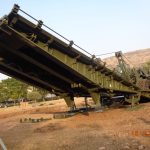In a swift and decisive operation early Thursday morning, security forces gunned down three Jaish-e-Mohammed (JeM) terrorists hiding in an under-construction building in Tral, Pulwama district, Jammu and Kashmir. Dramatic drone footage captured the militants moments before the encounter, showing them armed and taking shelter inside their hideout.
The terrorists were identified as Asif Ahmed Sheikh, Amir Nazir Wani, and Yawar Ahmed Bhat, all linked to the Pakistan-based terror group JeM, sources confirmed. Authorities are investigating their possible involvement in the Pahalgam terror attack on April 22, which claimed the lives of 26 civilians.
Inspector General of Police VK Birdi stated the encounter began following actionable intelligence about the presence of terrorists in the area. This was the second such operation in Jammu and Kashmir within three days, highlighting ongoing security challenges despite a recent ceasefire understanding between India and Pakistan.
The May 10 ceasefire understanding, initiated after outreach between the Director Generals of Military Operations (DGMO) of both countries, came with a stern warning from India that any further terrorist activities would be deemed an “Act of War,” prompting robust responses.
This encounter follows closely on the heels of Operation Sindoor, launched by India on May 7 to avenge the Pahalgam terror attack. The operation successfully eliminated over 100 terrorists and dismantled multiple terrorist training camps deep inside Pakistan and Pakistan-occupied Kashmir.
In retaliation, Pakistan escalated tensions by launching drone and missile attacks targeting Indian cities and military installations. However, India’s advanced air defence systems effectively thwarted these assaults. Subsequently, India carried out precision strikes on Pakistani military bases, destroying 11 airbases and delivering a significant blow to Pakistan’s strategic capabilities.
The Pulwama encounter and the successful defense against Pakistan’s provocations underscore India’s firm commitment to safeguarding its sovereignty and national security.













